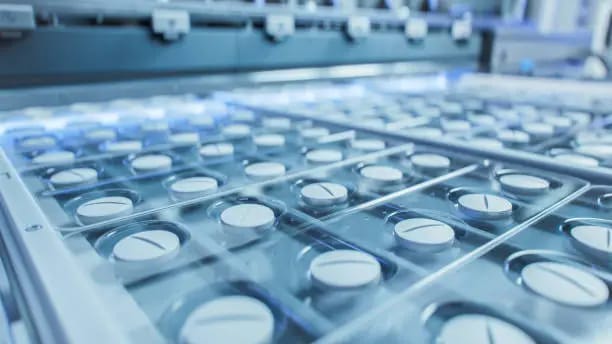The Differences Between Dehydrators And Freeze Dryers: The Details And Uses

During the manufacture of pharmaceuticals, food, and biotechnological products, effective drying techniques are vital for preserving product quality. Two of the most popular methods of drying are freeze-drying and dehydration. Both methods are used for extracting moisture, however, each one has its own advantages.
This article provides an in-depth analysis of the differences between freeze dryers and dehydrators: their specific features, relative advantages, and application scope within industry. So, these differences highlight something that can greatly impact businesses operating in B2B markets.
Differences Between Freeze Dryers and Dehydrators
Ever since the invention of food, biotechnological and pharmaceutical industries have relied upon different methods of drying food. Every company whether it is into cooking, food processing or wholesome relies on specialized equipment to get rid of moisture from food. Freeze dryer and dehydrator are two specialized moisture removing machines and each of them has its own method of moisture removal.
Freeze dryers
Also called lyophilizers, freeze dryers are machines that take moisture away from products by freezing them and subjecting them to a vacuum. Sublimation is when the frozen water turns to vapor without passing through the liquid phase. Freeze drying is one of the best drying methods since it preserves the integrity, shape, and structure of the final product. This makes it especially useful for temperature sensitive materials like biological products, vaccines and pharmaceuticals.
Product bioactivity, potency and quality are critical for many products, this requires the use of industrial freeze dryers. The most common uses of freeze drying techniques are in biologic drugs, vaccines, and lab samples. These products are required to be listened to with no alteration in their structures, that is why industrial freeze dryers are produced to guarantee precision and quality in high-stakes industries.
Dehydrators
Dehydrators, in contrast, remove moisture from products using a heat source. This method is also known as hot air drying and it is when hot air is blown to the product until all moisture is completely evaporated. Through reducing the highly concentrated water content, which microorganisms are able to thrive, dehydration extends the shelf life of the product. However, the heat can severely change the product’s structure, texture, and nutritional value permanently.
Dehydrators are chiefly used for preserving foods as well as products in which their appearance, texture, or nutrition is of little concern. For example, dehydrators are extensively used in the food industry to process fruits and vegetables and even meats, which do not have carefully captured compounds.
Differences Between Freeze Dryers and Dehydrators
Moisture Removal Process
Dehydrators and freeze dryers differ primarily in how all of them remove moisture.
- Freeze Dryers: Drying by freezing is the evaporation of ice, which needs to take place in a vacuum. Thus first freezing the product and then pulling a vacuum to turn the water into ice vapor. Their composition and bioactivity is very well protected.
- Dehydrators: The timer around the product, hence the product is heated, and as a result dries out. Moisture is removed this way, but highly dependent on temperature. This method is best in speed but sensitive components of the food and pharmaceutical industry may get damaged.
Effect on Product Quality
When product quality is requisite, freeze drying is the preferred choice. This method preserves the texture, shape, and chemistry of the product as much as possible. This is useful in drug stores as the potency and effectiveness of the medications must be retained. Food products also benefit from freeze drying since the color, flavor, and nutritional value is kept intact.
On the other hand, dehydrators induce heat which results in loss of structural integrity and appearance for some products. Change in shape and form which results from dehydrator heating includes product shrinkage, browning, and changes in texture. These changes however, are perfectly acceptable when there is further processing to the product or when the product is less sensitive.
Energy Consumption
In terms of energy economy, dehydrators appear to be the more economical choice of energy as compared to freeze dryers. This is due to the fact that dehydrators work by applying heat for moisture removal. The process is quicker and less technologically complex. Freeze dryers, however, require the product to be frozen first and then a vacuum applied, which tends to take a lot more energy.
Despite delivering the best results in product preservation, industrial freeze dryers are not suitable for everyone. Companies that want to control their energy usage and operational spending may choose dehydrators for products that are not sensitive to such changes.
Cost of Equipment
Freeze dryers come at a higher price than dehydrators because of their higher complexity and the level of precision required to operate them. They are also generally more expensive to maintain, and change in their basic operation is always complex. However, if product quality, stability, and potency are essential for a given business, then the price of a freeze dryer will remain reasonable.
Dehydrators are more accessible for small scale businesses because they are easier to operate and cheaper to maintain. They are ideal for companies that serve products not sensitive to changes in structure or nutritional value.
Applications of Freeze Dryers and Dehydrators
Pharmaceutical Industry
In the pharmaceutical sector, freeze dryers are crucial in maintaining the integrity of products like vaccines and biologics. Their application for drying, especially for injectable drugs and vaccines, gives them an upper hand as it guarantees the drug’s and vaccine’s efficacy and stability over time.
Dehydrators are not as useful in the pharmaceutical field, as their application of heat destroys the active ingredients in temperature sensitive medications.
Food Sector
Both freeze dryers and dehydrators are common in the food industry, with different uses of each. Dryers produce high quality and nutritious freeze-dried foods like instant soups, military meals, and survival food. These products retain their taste, texture, and nutrients which is very important.
Dehydrators, on the other hand, are less applied in other fields. Dried products such as fruits, vegetables, and meats need to have less severity in texture changes, which allows for the economy of scale. Dehydration is the most economical technique for producing dehydrated food which is more durable and does not require refrigeration for storage.
Biotechnology
Freeze dryers are equally important for biotechnology, where they are used to store biological samples such as proteins, antibodies, and enzymes. These materials are delicate to environmental conditions, and freeze-drying aids in maintaining their structure and function. Systems based on heat, like dehydrators, are generally too unrefined to dry biological materials in biotechnology.
The Role of Freeze Dryer Manufacturers in Industrial Applications
While previously ‘general’ customers of the industry hardly paid attention to the quality of the final product, there is a general shift towards demanding higher quality products that have longer shelf lives. This has directly led to the higher importance of freeze-dryer manufacturers. They supply modern industrial freeze dryers tailored to the specifications of different markets such as pharmaceuticals, biotechnology, and food manufacturing industries. Their methods make it possible for manufacturers to guarantee the long-term stability of sensitive products.
Industrial freeze dryers have improved features which enable accurate measurement and control of the drying process. This type of precision is needed to maintain the product’s chemical structure, biological activity, and quality. For instance, freeze dryers have customized temperature and pressure control features along with monitoring controls for consistency assurance of production batches.
Conclusion
Although both freeze dryers and dehydrators serve important functions in industrial operations, their applications are suited to different products and production requirements. To preserve the chemical structure and potency of sensitive products, freeze dryers manufacturers are required to answer the needs of pharmaceutical, biotechnology, and high-quality food industries. On the other hand, dehydrators are more economical and time effective when it comes to foods and products that are less sensitive to heat.
Selecting the correct equipment is vital for companies dealing with pharmaceutical or biotechnological products. Partnering with a well-known freeze dryer provides the newest technology on moisture extraction, which increases the stability, safety, and longevity of products. By comprehending the fundamental distinctions between freeze dryers and dehydrators, businesses can optimize their strategies to align with the contemporary marketplace.
Also Read: Exploring the Environmental Impact of Portable Power Stations





